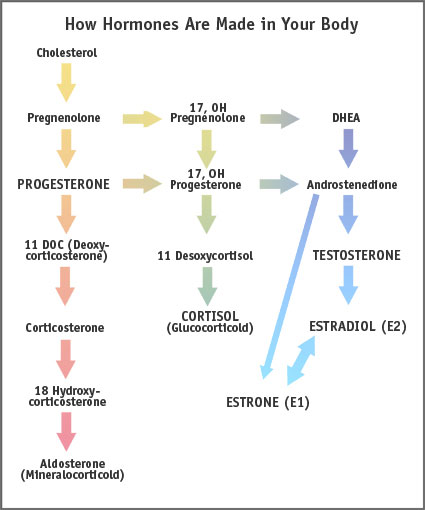DHEA and Adrenal Imbalance
Besides DHEA, your adrenals also make the stress hormones cortisol and adrenaline. Adrenal exhaustion from coping with chronic stress — from (among other things) poor nutrition, yo-yo dieting, emotional turmoil, and job-related stress — means your adrenals are bone-tired from pumping out cortisol and they simply can’t manufacture enough DHEA to support a healthy hormonal balance. The end result? You feel tapped out, overwhelmed and, often, depressed.
It’s likely that DHEA and adrenal function are related to neurotransmitter-release rates, based on the mood elevation our patients report after just two weeks of adrenal support. But more research is needed to isolate the individual effects of DHEA from the hormones it gets metabolized into before we can know for sure what part it plays in all of this.
One thing we do know is that adequate levels of DHEA are needed to ensure your body can produce the hormones it needs when it needs them. In that balanced state your mood is stable and you feel clear-headed, joyful and vigorous. DHEA is the best “feel-good” hormone we know. And it works quickly and effectively when taken with the right combination of support.
When DHEA levels are low, your body does not have enough working material for proper endocrine function. This throws off your hormone production and you feel a general sense of malaise, along with other symptoms of hormonal imbalance — how severe depends on how many other demands are being made on your body at the same time.
There is a growing body of evidence that healthy levels of DHEA may help stave off Alzheimer’s disease, cancer, osteoporosis, depression, heart disease and obesity, but there is still no clearcut consensus. There may be some increased risks associated with DHEA for women with a history of breast cancer — all the more reason to take DHEA under medical supervision.
At our practice we use DHEA where we’ve seen reliable proof of efficacy — in cases of adrenal imbalance.
DHEA and Adrenal Imbalance
Your lifestyle, diet and stress levels all contribute to the amount of DHEA your body can produce in a given period. At our practice we look first and foremost at adrenal function, using DHEA levels as one of several diagnostic tools.
Think of our exhausted mother, Lisa. Like her, your adrenals work tirelessly to meet the demands placed on them until they are utterly tapped. Without adequate support, they spiral downward into adrenal imbalance and eventually adrenal exhaustion.
Most of the women we see at our practice — and I mean 99% — have some indication of adrenal imbalance, including symptoms of low DHEA levels, such as:
 Extreme fatigue
Extreme fatigue- Decrease in muscle mass
- Decrease in bone density
- Depression
- Aching joints
- Loss of libido
- Lowered immunity
But simply adding more DHEA to the equation is not the answer — despite what some of the popular products claim. DHEA alone can’t fix adrenal imbalance (don’t believe any product that says it will!), but it can be an important factor in a combination approach that includes hormonal and nutritional support, lifestyle changes, and proper rest. For more information on adrenal function and adrenal exhaustion, see our extensive list of articles in our Adrenal Health section.
